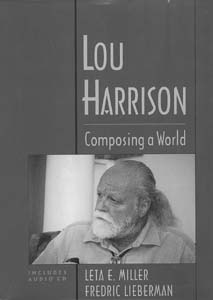Lou's World
A new biography explores the many sides of Aptos composer Lou Harrison
By Philip Collins
Readers get more than words and pictures in Lou Harrison: Composing a World, Leta Miller and Fredric Lieberman's new biography of Aptos composer Lou Harrison. Not only does the book make a fascinating read for professionals and the general public alike, it also includes a CD featuring rare archival recordings. Local readers may also derive some satisfaction just knowing that the past 45 years of Harrison's prolific career have taken place right here in Santa Cruz County.
What is most remarkable about Composing a World is the degree to which the book resonates with fundamental aspects of Lou's art and character. As in his music, the book is well grounded in theory while readily gratifying to readers of diverse orientations. The authors have succeeded in creating a biography that encompasses Harrison's far-reaching accomplishments in a manner that is as accessible to the casual reader as it is invaluable to those of serious musical intentions.
The book's tone is cordial even in the more analytical chapters. In fact, how many composer bios can you think of in which the subject is referred to on a first-name basis? As stated in the Introduction, "No one who has met Lou would dream of calling him Mr. Harrison after more than five minutes." One can imagine readers feeling like Lou's neighbors after reading Composing a World, and it would only be fitting, since he has furthered the cross-dissemination of world-music traditions more than any other American composer of our time.
The sheer volume and diversity of his accomplishments are part of the reason it has taken so long for the publication of a thoroughly researched biography (Heidi Von Gunden's 1995 biography barely qualifies as such). In addition to his 350 or so scores, there are his noteworthy contributions as a musical performer, teacher, reviewer, theoretician, historian and instrument builder. His other hats--as poet, painter, calligrapher--are also important.
Although articles and liner notes about each of the above facets have appeared over the years, Miller and Lieberman break new ground by drawing them together and showing their relevance within the historical context of this century's musical developments. The authors demonstrate how Lou's unique character has manifested itself in his career as much as in his lifestyle. With an explorer's zeal, he carved out his life's course irrespective of established channels, career goals and naysayers.
The chapters are subject-based and chronologically discrete, enabling one to read them in any sequence at no sacrifice to continuity. The authors' description of Lou's childhood is quite revealing. In the pioneer stock of his mother, "Cal," one finds the source of the composer's unshakable independence of thought, his voracious reading habits and his insatiable appetite for knowledge.
Precociousness was evident early on. By the age of 2 1/2, Harrison was eliciting rave reviews as "Buster" in the play Daddy Long Legs, and by 10 he'd come up with his first composition. Infant tinkerings with the family radio, and later a violin, heralded his eventual immersion in the field of instrument construction.
As the book wends through the years, one discovers that there have been no "dry periods," creatively speaking. Even during his hospitalization in 1947, resulting from a nervous breakdown, Lou sketched out his Symphony in G. To this day, at 81, he continues to compose regularly, write poetry and study American Sign Language. Chapter Four, "Music and Dance," recounts the collaborations and extraordinary circumstances surrounding Lou's compositions, choreographies and performances in the dance genre. The chapter affords special attention to the San Francisco years, 1939-41, when Lou and his friend John Cage--jointly inspired by the teachings of Henry Cowell--put on concerts of junkyard instruments.
There is a chapter dedicated to Lou's brazen political creations, another one about his gayness, which he has always been frank about admitting. The more theoretical chapters--on tuning, composing processes and instrument building--may not appeal as broadly as the rest, but they are nonetheless written in a user-friendly style. The 70 interviews and innumerable correspondences with musical giants of the 20th century--Ives, Schoenberg, Cowell and many others--are a delight to read.
Composing a World is a major achievement. In addition to introducing us to the wealth of Lou's musical legacy thus far, the authors also bring our attention to the integrity he invests in all his undertakings, be they musical, personal or other. We see how Lou's enthusiastic desire to understand all aspects of a given area of inquiry offers an inspiring model of living life to its fullest, regardless of one's profession.
[ Santa Cruz | MetroActive Central | Archives ]
Copyright © Metro Publishing Inc. Maintained by Boulevards New Media.
![]()

Lou Harrison: Composing a World by Leta Miller and Fredric Lieberman; Oxford University Press; $35 cloth.
From the October 8-14, 1998 issue of Metro Santa Cruz.
![[MetroActive Books]](/gifs/books468.gif)